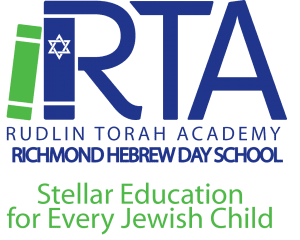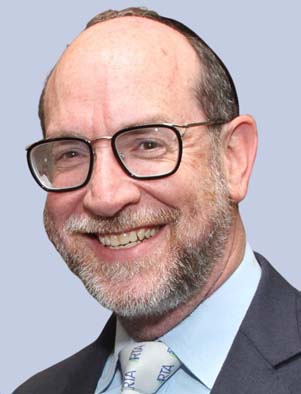By Steven Skaist
 We are excited to officially welcome Rabbi Elisha Paul to Rudlin Torah Academy as its new Head of School. Rabbi Paul has hit the ground running and is geared up for a successful launch of the new school year. I had the opportunity to sit down with Rabbi Paul and ask a few questions.
We are excited to officially welcome Rabbi Elisha Paul to Rudlin Torah Academy as its new Head of School. Rabbi Paul has hit the ground running and is geared up for a successful launch of the new school year. I had the opportunity to sit down with Rabbi Paul and ask a few questions.
What drew you to RTA?
RP: As I began to learn about RTA, I was struck by the way the school is deeply rooted, yet forward focused. RTA has cultivated an atypically high number of young second-generation families that have chosen to make Richmond their home and RTA their school of choice.
Seeing alumni of the school who are now parents of RTA students is a positive sign upon which to build future success.
This is attractive not only for these alumni parents, but also for new RTA families. This demographic data point unearths the underlying value latent within the broad RTA community. The rich educational history of RTA has created a palpable and nurturing atmosphere for students that is unique even among Jewish day schools; a sort of passion and love for learning and for the Jewish people, centered around the student’s needs, seems to form the character of the school. This is a remarkable platform for unlimited possibility.
What motivated you to go into Jewish education as a career?
RP: Coming from a family of educators in both public and private schools, I am forever a student. Always learning new ideas, I thrive in the educational setting.
I relate well to young people and am energized by the potential for their future growth. I went to Jewish day school as a child and was inspired to share the positive experience I had with others, but also to do things a little differently.
Fundamentally, though, I am motivated by the fact that Jewish education is the fulcrum of our Jewish future. Reported across Jewish denominations (and non-denominations), there is direct correlation between levels of Jewish education and Jewish identity. Securing our Jewish future is the urgent need of our time, and this urgency compels me to make this my life’s calling.
Explain what the impact a dual curriculum, including both Judaic and general studies, has on your students.
RP: A dual curriculum sets the bar high for student work ethic development, multilingual readiness and fluency, and perhaps most importantly, the development of analytic and in depth thinking skills.
There’s a rumor that Talmud is studied in South Korean public schools. I once had the occasion of interviewing a math teacher with a Ph.D. from South Korea, and I asked the gentleman if this rumor is in fact true. He replied, “yes, it’s true, everyone studies Talmud from a young age.”
When I asked for an explanation, he laughed and said, “in South Korea we believe there’s a big difference between knowledge and wisdom; knowledge without wisdom is insufficient. Since Jews possess a tremendous amount of Jewish wisdom in the Talmud, it was adopted as a standard course of study in South Korean public schools.”
I don’t know that South Korea is producing an above average number of rabbis, but this illustrates the power of an education modeled on the integration of the Jewish wisdom found in our rich heritage and a strong preparatory general studies education.
The result, and RTA’s goal, is to empower the next generation of our Jewish community with a wholesome, well- rounded education that prepares our graduates to excel in any path they may wish to pursue.
Describe an impactful experience and how it shaped how you think as an educator.
RP: As an educator, I am charged with the sacred responsibility to educate our community’s children. Yet, I am struck by my limited time with my students. I once had a student who passed away after a prolonged illness and it taught me to try to remember to seize the day and the moment at hand.
As my former principal, Rabbi Yehuda Mandelcorn, who passed away at a relatively young age, used to teach us regarding the Mitzva of sefirat haomer – the counting of the days between Passover and Shavuot – the lesson to be learned is to not just count our days but to make our days count.
Experiencing the death of a mentor and a student drives home, for me, the importance of maximizing the student experience to its fullest and always looking to find teachable moments, even outside the classroom.
What book are you currently reading?
RP: I’m currently concluding the book, “High Conflict: Why We Get Trapped and How We Get Out,” by Amanda Ripley. The book explores that while it is appropriate at times to disagree, especially in areas that one cares deeply about, disagreement is not the same as being disagreeable.
Though tension can devolve into all-consuming fights fraught with challenging and high emotion, tension, when approached properly, can be healthy.
When I look at RTA, I see a beautifully wide range of people from all sorts of backgrounds. Valuing the different perspectives of institutional stakeholders is critical to the success of any communal institution that strives to serve a broad array of constituents, and can actually serve to enhance the experience for everyone involved.
In the genre of Jewish reading, I am currently proofreading initial drafts of the translations of two important works of the first Chief Rabbi of Israel, Rabbi Abraham Isaac Kook.
One book is a translation of a modern day Guide for the Perplexed, and the other is a selection of reflections that Rav Kook shared about his personal spiritual path.
To learn more about RTA, reach out to Rabbi Paul at rabbipaul@rudlin.com.










